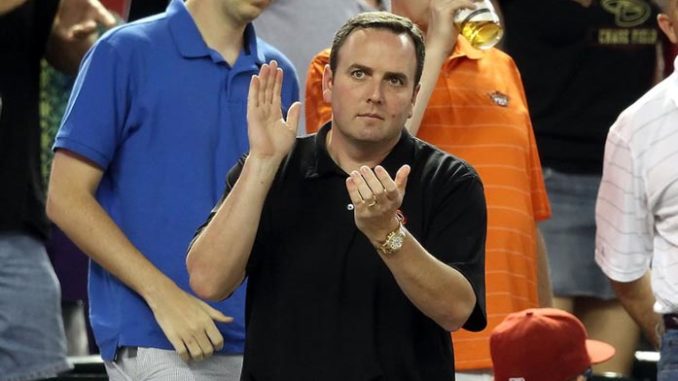
PHOENIX – Opening Day has come and gone, but the main attraction, the centerpiece of it all, wasn’t there. In 2020, it was just a date on a calendar. There was no baseball on March 26, when all 30 major league clubs were scheduled to play.
There was no call from the plate umpire to “Play ball!” There was no first pitch to cheer. Nobody fired t-shirts into the crowd. There was no indulging in those ice-cream sundaes piled into miniature batting helmets. No bunting hung from the railings. There was no seventh inning stretch because there wasn’t even a first inning.
There might be no crying in baseball, but there was crying for baseball when the Covid-19 pandemic led to the indefinite suspension of the 2020 season.
Arizona Diamondbacks’ President and CEO Derrick Hall has seen a lot of Opening Days with the organization, “and this hurts,” he said. “For me, it’s mostly because I can’t be with the rest of my employees right now in a workplace.”
Like many across the country, members of the Diamondbacks front office are working from home. It is a challenge, but they have other, more important, problems to consider. Everyone’s health, for one. And the economic health of impact the organization for another.
“I think the unknowns are what keep us up at night,” Hall said. “We don’t know how long and how severe this will be. We’re in the business of bringing crowds together and this is a time when they’re discouraging any crowd-gathering whatsoever.”
Though the organization relies heavily on game attendance, concessions and television contracts for revenues, Hall is fairly optimistic about the eventual economic outcome because he believes there will eventually be an Opening Day in 2020.
“I’m not overly concerned, knowing that we will have a season this year and I look forward to that very much, and we’ll make the best of it,” Hall said. “And we’ll have a new Opening Day that will be targeted, and we will promote it, and we will sell it, and we will celebrate it, and I’m very excited for that.”
The club is on solid enough financial footing that the team’s Diamondback Foundation has donated just more than $1 million to be spread among non-profit organizations that provide emergency food supplies and distribution, support children of working healthcare professionals and benefit those working in healthcare fields.
Hall said he felt the unanimous decision by teams to ratify an agreement with the Major League Players Association was a smart decision and the right step to take. The teams and union agreed to try to play a regular season of 100 games with the postseason going into November, if the coronavirus pandemic eases enough to allow for it.
As far as what the next “Opening Day” will look like, Hall’s still unsure because baseball is “really at the mercy of the (Centers for Disease Control and Prevention) and other health agencies.”
But when that day comes, Hall is adamant that fan and safety will be baseball’s top priority – as always.
“We need to make sure that fans are comfortable going back into large crowds,” Hall said. “I’m sure that once we have that green light everybody will be. But again, not knowing what that’s going to look like – there’s just so much uncertainty – we’ll be prepared for any scenario possible as long as we can throw that first pitch.”
Until then, Chase Field sits empty, patiently waiting for the pop of a mitt, the crack of a bat, that cry of “Play ball!” from the ump.
“I don’t think life is right without baseball,” Hall said. “The great thing about baseball is it is always the thing that returns us back to normalcy because historically – even after wartime, after 9/11, it will be after coronavirus – that’s when the world feels right again.
“That’s when we all know that life is normal when we’re back in a ballpark. And I look forward to us playing a starring role in recovery once again.”
